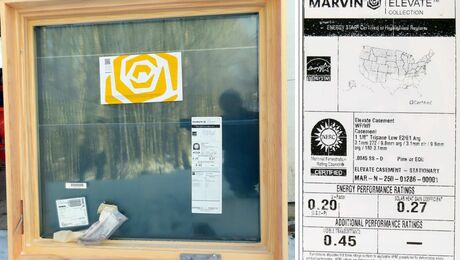ERV – where does the moisture go?
I understand the difference betwen an HRV and an ERV – that the HRV transfers heat between the incoming and outgoing air while an ERV transfers both heat and moisture. I am puzzled as to how, in a house with an ERV, the moisture generated by bathrooms, laundry, people, dogs etc actually leaves the building if it is transferred to the incoming airflow ? Also, what stops odors being transferred between outgoing and incoming air ? I haven’t mentioned cooking because I’m assuming a range hood with its own make-up air will be used.
Thanks
GBA Detail Library
A collection of one thousand construction details organized by climate and house part









Replies
Peter,
Moisture is entering and leaving a house all the time. One of the main mechanisms for moving moisture is air leakage through the building envelope. In winter, indoor air tends to be humid; some of this humid indoor air leaks out of ceiling cracks, and is replaced by infiltrating air, which tends to be dry. This process tends to lower indoor humidity levels.
In summer, when outdoor air may be hot and humid, infiltration may raise rather than lower the humidity level of indoor air.
Mechanical ventilation with an HRV or ERV during the winter tends to lower indoor humidity levels, since cold outdoor air can't hold much moisture. While an ERV transfers some of the moisture in the outgoing air stream to the incoming air stream, it can't transfer all of the moisture. The net effect in winter is usually to lower indoor humidity levels. The longer the ERV or HRV operates, the dryer indoor air will become.
In climates with hot, humid summers, operating any type of mechanical ventilation tends to raise indoor humidity levels.
If you are worried that an ERV won't remove indoor moisture fast enough during the winter, then you should clearly choose an HRV. If you do, you won't be alone. Many people have concluded that ERVs don't make much sense, especially if the mechanical ventilation system is used to exhaust air from bathrooms. According to ventilation expert Max Sherman (who is a senior scientist at LBNL), "Since an ERV recovers moisture (and maybe formaldehyde), you are not really exhausting moisture from the bathroom, you are redistributing it. There may be times of the year where that is just fine, but there will be times when you really just want to exhaust it."
For more information on this issue, see Does a Home with an HRV Also Need Bath Fans?
Thanks Martin,
Since my winters are mild and wet (so are the summers...) I'll plan to use an HRV.